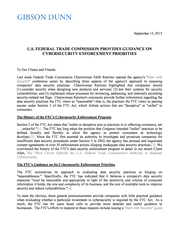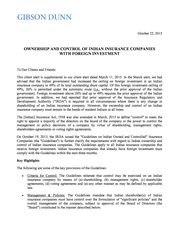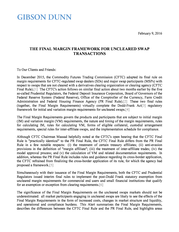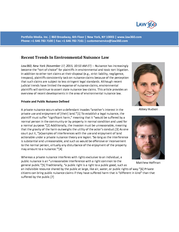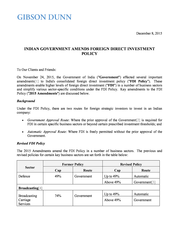U.S. Federal Trade Commission Provides Guidance on Cybersecurity Enforcement Priorities - September 15, 2015
Gibson, Dunn & Crutcher
Description
Karl G. Nelson - Dallas (+1 214-698-3203, knelson@gibsondunn.com)
Joshua A. Jessen - Orange County and Palo Alto (+1 949-451-4114/+1 650-849-5375,
jjessen@gibsondunn.com)
Michael Li-Ming Wong - San Francisco/Palo Alto (+1 415-393-8333/+1 650-849-5393,
mwong@gibsondunn.com)
Ryan T. Bergsieker - Denver (+1 303-298-5774, rbergsieker@gibsondunn.com)
Richard H.
Cunningham - Denver (+1 303-298-5752, rhcunningham@gibsondunn.com) Eric D. Vandevelde - Los Angeles (+1 213-229-7186, evandevelde@gibsondunn.com) Europe James A. Cox - London (+44 207 071 4250, jacox@gibsondunn.com) Andrés Font Galarza - Brussels (+32 2 554 7230, afontgalarza@gibsondunn.com) Kai Gesing - Munich (+49 89 189 33-180, kgesing@gibsondunn.com) Bernard Grinspan - Paris (+33 1 56 43 13 00, bgrinspan@gibsondunn.com) Alejandro Guerrero Perez - Brussels (+32 2 554 7218, aguerreroperez@gibsondunn.com) Jean-Philippe Robé - Paris (+33 1 56 43 13 00, jrobe@gibsondunn.com) Michael Walther - Munich (+49 89 189 33-180, mwalther@gibsondunn.com) China Kelly Austin - Hong Kong (+852 2214 3788, kaustin@gibsondunn.com) India Jai S.
Pathak - Singapore (+65 6507 3683, jpathak@gibsondunn.com) © 2015 Gibson, Dunn & Crutcher LLP Attorney Advertising: The enclosed materials have been prepared for general informational purposes only and are not intended as legal advice. 4 .
Cunningham - Denver (+1 303-298-5752, rhcunningham@gibsondunn.com) Eric D. Vandevelde - Los Angeles (+1 213-229-7186, evandevelde@gibsondunn.com) Europe James A. Cox - London (+44 207 071 4250, jacox@gibsondunn.com) Andrés Font Galarza - Brussels (+32 2 554 7230, afontgalarza@gibsondunn.com) Kai Gesing - Munich (+49 89 189 33-180, kgesing@gibsondunn.com) Bernard Grinspan - Paris (+33 1 56 43 13 00, bgrinspan@gibsondunn.com) Alejandro Guerrero Perez - Brussels (+32 2 554 7218, aguerreroperez@gibsondunn.com) Jean-Philippe Robé - Paris (+33 1 56 43 13 00, jrobe@gibsondunn.com) Michael Walther - Munich (+49 89 189 33-180, mwalther@gibsondunn.com) China Kelly Austin - Hong Kong (+852 2214 3788, kaustin@gibsondunn.com) India Jai S.
Pathak - Singapore (+65 6507 3683, jpathak@gibsondunn.com) © 2015 Gibson, Dunn & Crutcher LLP Attorney Advertising: The enclosed materials have been prepared for general informational purposes only and are not intended as legal advice. 4 .

